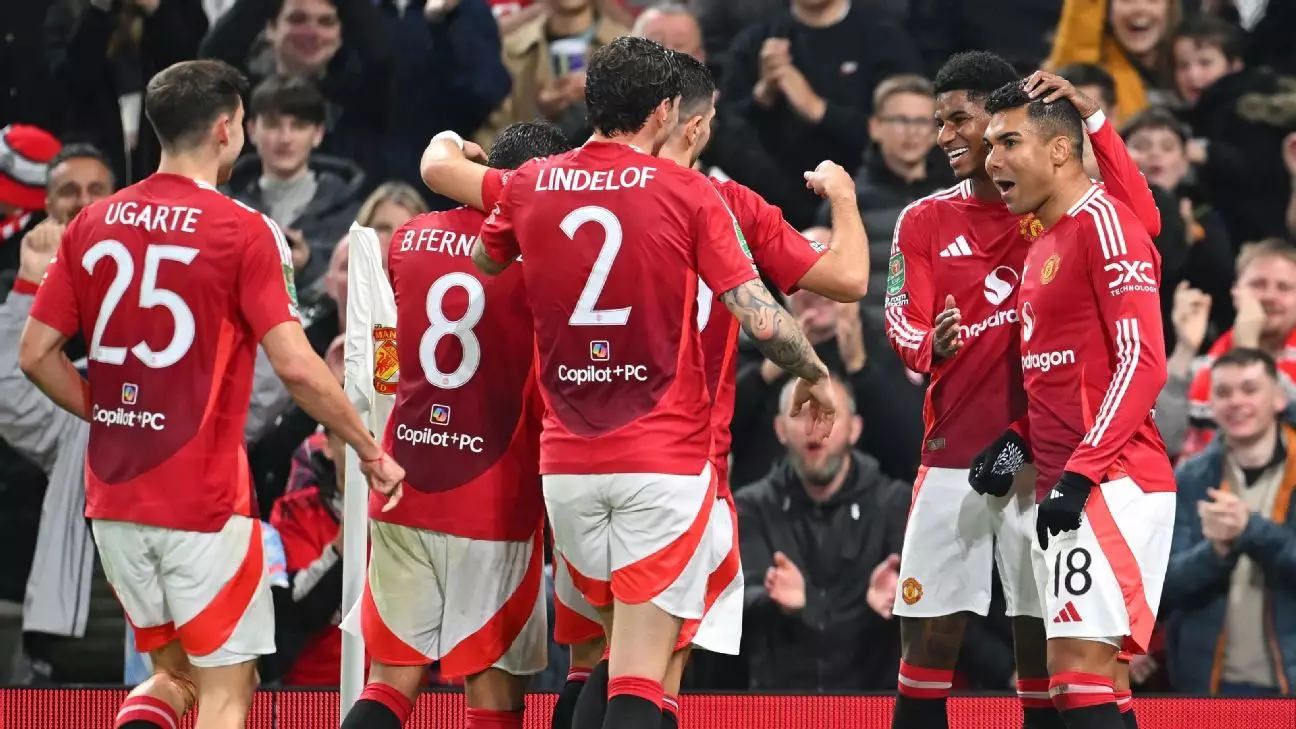The saga at Manchester United continues to unfold in a manner that has become all too familiar for fans and observers alike. Following yet another managerial dismissal, this time Erik ten Hag, an unexpected 5-2 triumph against Leicester City in the Carabao Cup brought a momentary glimmer of hope. Yet, this victory, celebrated in joyous laps of honor around Old Trafford, raises significant questions about the integrity of the team and whether any real change is on the horizon.
In the backdrop of Old Trafford, filled with applause, the players embraced a rare chance to bask in the limelight after what has been a dismal start to their season. The interim coach, Ruud van Nistelrooy, momentarily shared in the moment before retreating to the dressing room. His optimism about newfound luck paints a picture of temporary relief, yet it juxtaposes sharply against the stark reality of the team’s overall performance — currently languishing in 14th place in the Premier League standings.
It is crucial to dissect the underlying motivations behind the players’ exuberance. After a series of disappointing results, the outcome against a weakened Leicester City felt less like a complete turnaround and more akin to a collective sigh of relief. In their eagerness to engage with the fans and embrace even the slightest success, the players risk promoting an illusion that may not reflect future performances.
With the confirmation of Ruben Amorim’s prospective appointment on the horizon, the narrative of Manchester United as a club plagued by managerial instability resurfaces. Van Nistelrooy becoming the ninth manager since Sir Alex Ferguson’s departure in 2013 is deeply troubling. What does this revolving door indicate about the structural issues within the club? It emphasizes a pattern where players remain unchanged while management comes and goes. The blame, often attributed to the coaches, may stem instead from a deeper malaise.
The resignation of Ten Hag followed an era characterized by unpredictability in tactics and team selection, although it is equally essential to acknowledge that many players failed to meet their potential under his leadership. The reality is sobering; individuals who once shone brightly now seem unable to deliver consistently. The undercurrent of responsibility lies not solely with the dismissed manager but also with the players who repeatedly fell short of expectations.
Despite the scoreline, the performance against Leicester should not be romanticized. The match exposed glaring issues within Manchester United’s defensive line, with numerous lapses that a more potent opponent would likely exploit. While Casemiro’s two goals and Bruno Fernandes’s significant contributions are commendable, they cannot mask the vulnerable defense that allows simple dispossessions to unfold under pressure.
what also stands out following this fixture is the potential quicksand that lies ahead for Amorim. As he prepares to step into a role burdened by history, he will inevitably inherit a squad that lacks equilibrium. Despite the temporary headway achieved in the victory, the team’s performance suggested that much deeper coaching and refinements will be necessary for real progress.
As Manchester United gears up for a high-stakes encounter against Chelsea, the atmosphere is imbued with cautious optimism. Fans hope for a continuation of momentum, but lingering doubts remain: Could it be another fleeting moment of success that ultimately fails to signify a turnaround? The road ahead appears steep, especially for a new manager as he evaluates which players are prime for a resurgence and which may be past their peak.
The underlying sentiment prevails that while a singular victory evokes feelings of joy, it also carries the weight of immense responsibility. Teams often experience a short-lived morale boost following a managerial change, but history has shown that unless genuine systemic shifts occur, the performance inconsistencies will reemerge. For United, simply rallying for a single match is insufficient; a commitment to sustained improvement is critical.
While Manchester United’s win against Leicester was a necessary reprieve from their troubles, it serves as a reminder of the deep-rooted challenges that still plague the club. As they navigate the tricky waters of managerial change, the focus must be on long-term solutions rather than ephemeral victories. The evolution of this storied club hinges not merely on the choices of a new coach but on a collective effort to rise from the ashes of underperformance.


Leave a Reply